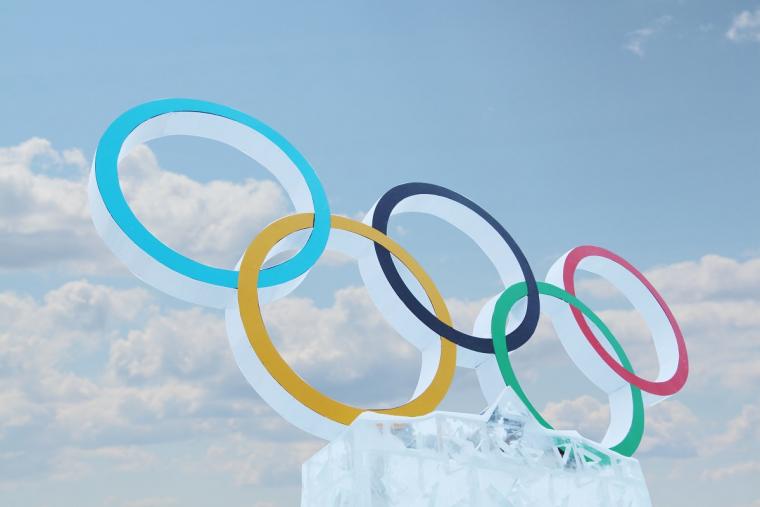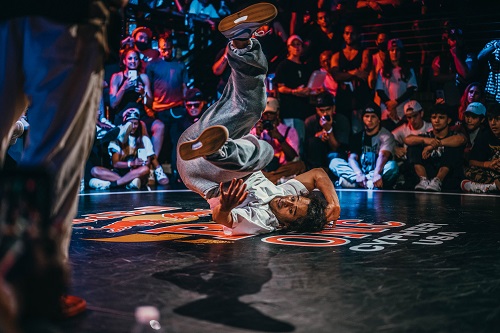

Breakdancing will make its Summer Olympics debut at the 2024 Paris Games, which already are less than three years away. That means we’re likely to start seeing more national emphasis on breakdancing competitions like the one held last month in Boston.
Coinciding with the closing ceremonies of the 2020 Summer Olympics on the other side of the world in Tokyo, the Red Bull BC One breakdancing competition took place Aug. 8 at Big Night Live, a live music venue in Boston. Red Bull BC One is considered the largest and most prestigious one-on-one breaking competition in the world, and some of its competitors are already being scouted by the U.S. Olympic Committee, according to Boston ABC-TV affiliate WCVB.
The Boston breaking competition — known as a “cypher” — was one of four qualifying events for the Red Bull BC One USA Finals held in late August in Orlando, Fla. Other cities hosting events were Houston, Los Angeles and New York. The Red Bull BC One World Finals will take place in Gda?sk, Poland, on Nov. 5-6.
“Every year, thousands of breakers compete for a chance to represent at the Red Bull BC One World Final,” according to the Red Bull BC One website. “[Sixteen] B-Boys and 16 B-Girls earn the right to enter an all-out battle on the Red Bull BC One stage, but only one will be crowned the champion.With 17 World Finals hosted in major cities around the world since 2004, Red Bull BC One has over 60 qualifier events and programs (cyphers and camps) in over 30 locations.” (Breakdancers are known as “b-boys” and “b-girls.”)
“Breaking is everything. Breaking is love, peace — it keeps everything together,” B-Boy Flo told Boston’s WCVB. “Once it goes to the Olympics, I’m pretty sure it’s going to get bigger and bigger. A lot of people are going to be doing it and then they’ll realize the potential for it. It has a lot of aspects to it and I’m pretty sure the world will love it.”
A Sports Destination Management poll conducted earlier this year indicated that nearly one-third of readers think breakdancing — an activity that began on the streets of New York City in the 1970s — holds potential for “good growth” in the United States, while almost 30% said they don’t think the U.S. will be a “strong” breakdancing market.
“With this program, we are making the Olympic Games Paris 2024 fit for the [post-2020] world,” International Olympic Committee President Thomas Bach said in a statement when the IOC officially announced breaking (as it will be known in the Olympics) for the 2024 Games. “We are further reducing the cost and complexity of hosting the Games.”
Olympic breaking competitions will take place at Palace de le Concorde, a prestigious downtown venue that also will host sport climbing and 3-on-3 basketball.
“Most of us knew that this could be big one day. We just didn’t really know how it would happen,” veteran b-boy Moises Rivas, who dances under the name “Moy,” told The Washington Post in February, referring to breaking achieving Olympic status. “But it has always had a path. We just had to deal with the misconceptions, negative connotations and people who didn’t always want to give it the credibility it deserves.”
As Sports Destination Management reported in December, when the IOC officially welcomed breaking to the Games, adding the sport to the Paris Games makes sense on multiple fronts. First, breakdancing is popular in France. Second, viewership of the Games gets older with each Olympic cycle, and breaking could, um, break that trend.
Breaking debuted at the 2018 Youth Olympic Games in Buenos Aires, Argentina, where the sport attracted 90,000 spectators on its first day of competition, according to the World DanceSport Federation. Breakers, alone or in teams, competed in “battles” by “taking turns to show off an array of imaginative, acrobatic and improvised moves to a DJ’s beat, watched by a judging panel that picks the winner,” the Associated Press reported in 2019.
“Getting breaking in the Olympics was the first hurdle,” according to Mic.com, an internet and media company catering to millennials. “The next and arguably more important hurdle is fitting a counterculture, spontaneous, communal breaking experience into the Olympics’s rigid structure. Unlike any other Olympic sport, the athletes in breaking compete with the crowd encircling them, as a host on the mic hyp[es] up the action while the athletes feed off the energy … of it all. An easy fix would be to simply have that same crowd encircle them but the energy of the live DJ scratching and the host would surely be replaced with pre-planned music and TV announcers breaking down the moves rather than yelling at the breakdancers to give it their all. Then, there’s the question of how prominently the Olympics will feature breakdancing’s inextricable tie to the history of hip-hop in the competition.”
“What we’re doing is a tradition. What we’re doing is folklore. We’re making sure we don’t forget the trials and tribulations of that first wave that stepped forward and said, ‘We are awesome,’” legendary B-Girl Ana “Rokafella” Garcia said at a New York cypher earlier this year, according to Mic.com. “A lot of these people dancing against each other are part of a generation. Every five years, I’ve witnessed a turnover with new faces. We need more people to take up this torch and carry this legacy.”
As a teaser for what we can expect in 2024, Red Bull BC One has compiled a highlight reel of “the best breaking battles” since 2001.

